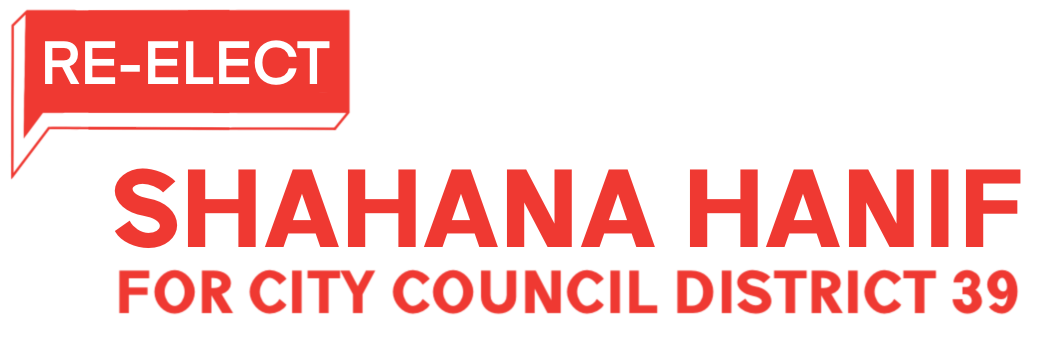RESTORING AND SURVIVING:
NYC Survivor Security Plan
Shahana’s gender justice advocacy in District 39 is rooted in collaborating with organizations and multilingual service providers on the ground, including Sakhi, Malikah, The Center for Anti-Violence Education, Womankind, Asiyah Women’s Center, Sanctuary for Families, Planned Parenthood, Peer Health Exchange, and Girls for Gender Equity. In April 2019, Shahana partnered with Asiyah Women’s Center to advocate for Ms. Zahan, a District 39 resident living in an abusive household.
Social distancing and lockdown due to COVID-19 has caused a serious issue of underreporting domestic and intimate partner violence throughout City Council District 39 and beyond. This is also a time when more immigrant women are fearful of seeking domestic violence resources. Advocates like Shahana understand how domestic violence intersects with issues of immigration, language access, and homelessness. Shahana worked with leaders and constituents in District 39 to raise more than $4,000 to ensure Ms. Zahan's financial security, showing that it takes a village to ensure the safety and stability of survivors. This effort, along with Shahana’s continued advocacy for survivors, shapes her NYC Survivor Security Plan.
Survivors should not have to return to an abusive situation to keep a roof over their head or food on the table — and New York City can do more to ensure that survivors of abuse are financially secure. Our district must equip survivors of gender-based and intimate partner violence with liberatory tools grounded in their safety and joy, using restorative approaches to dismantle pain and trauma. As a City Council Member, Shahana will establish a Survivor Security Fund to provide financial assistance for housing, bills, and other basic recovery needs that survivors of abuse may need help paying for. Receiving support from the Survivor Security Fund would not disrupt a survivor's ability to qualify for Medicaid, SNAP, and other public assistance programs.
As City Council Member, Shahana will also push to expand three critical legal protections for survivors of abuse:
+ Early lease termination
Survivors should be able to leave an abusive household without worrying about paying back rent or legal fees to end a lease early. Despite this, New York is one of two states that requires survivors to be current on their rent to terminate their lease and requires a court order to release survivors from their lease. Shahana will advocate to ensure these financial barriers don’t prevent survivors from leaving an unsafe household.
+ Lock-change policy
Currently, New York does not have a lock-change policy for domestic violence survivors. Survivors trying to keep their families and themselves safe should not be responsible for the cost of installing new locks and should be permitted to request landlords to change locks on both the tenant’s unit and the exterior door without fear of violating lease terms. As Council Member, Shahana will advocate for legislation that requires landlords to change locks for survivors without having them bear the financial burden.
+ Workplace and housing protections
The City Council should further expand protections for domestic violence survivors within the City’s current Human Rights Law to ensure that survivors are not discriminated against in housing and employment. Shahana will work with agencies such as the New York City Commission on Human Rights (NYCCHR), New York City Housing Authority (NYCHA), and Housing Preservation & Development (HPD) to ensure that domestic violence survivors are guaranteed safe, affordable housing and secure employment.
Shahana recognizes that other crucial tools in ensuring the safety of survivors and preventing domestic violence are:
+ Comprehensive sex education
Comprehensive sex education needs to focus on the issue of consent between partners and building healthy relationships. In addition, comprehensive sex education needs to have a curriculum that is inclusive of all gender identities, ethnicities, races, and abilities, and does not create stigma. Finally, comprehensive sex education should accurately inform individuals about their reproductive health needs and resources such as abortion access, contraceptive access, and other resources.
+ Rehabilitative, trauma-informed care
Caring for victims of physical abuse, sexual abuse, emotional abuse, economic abuse, and psychological abuse requires a holistic, intersectional, and thoughtful approach. This involves employing social workers as part of the City Council staff, acting as community liaisons to help survivors access resources, creating an anonymous helpline for survivors of violence to confidentially obtain district-specific support, and funding organizations providing mental health care for survivors of violence, as well as funding for individuals to access adequate and trauma informed counseling through the Survivor Security Fund.
Related helplines and legal resources:
National Domestic Violence Hotline: 800-799-7233 or 800-787-3224
Sakhi for South Asian Women Helpline and Safety Planning During the Pandemic: 212-868-6741, Mon-Fri, 10 am to 5 pm
Domestic Violence Project at the Urban Justice Center for legal and advocacy services: 718-875-5062
The Jewish Board of Family and Children's Services - Borough Park Counseling Center: 718-435-5700
Park Slope Safe Homes Project: 718-499-2151
Safe Horizon-Brooklyn Child Advocacy Program: 212-577-7777
Safe Horizon-Brooklyn Community Programs: 800-621-HOPE (provides free lock change for survivors)
South Brooklyn Legal Services: 718-237-5563
Her Justice: 718-562-8181
